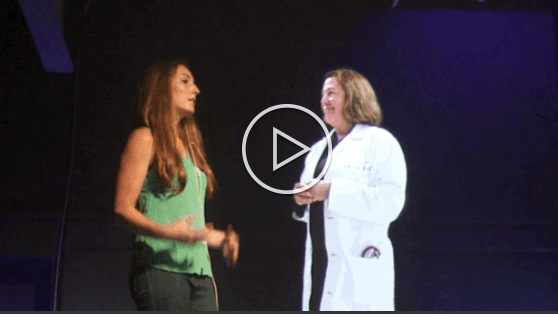USC’S VIRTUAL CARE CLINIC IS A FIRST-OF-ITS-KIND HOSPITAL USING NEW TECHNOLOGY TO MAKE HEALTH CARE BOTH MORE PERSONALIZED AND MORE ACCESSIBLE.
To open the 9th annual USC Body Computing Conference held earlier this month, Dr. Leslie Saxon, a cardiologist and the conference’s founder, screened a short video for a mixed crowd of technologists and medical specialists. In the video, she stands front of a camera while her image is beamed in real time as a hologram to her patient in Dubai. Saxon asks her patient about her symptoms, diagnoses the problem, and walks her through her treatment options, face-to-face, without ever leaving her office.
This is what Saxon calls hologram house calls, and it’s part of the University of Southern California’s recently announced Virtual Care Clinic that will use technology like virtual reality, artificial intelligence, mobile apps and wearables to make health care both more personalized and more accessible. The clinic is founded on the belief that in the same way we’ve seen a revolutionary change in the way culture and society use technology, we’ll soon see the same in the medical industry.
“This is really the moment to transform traditional health care and transform digital health care systems,” says Saxon, who is also the executive director of USC’s Center for Body Computing. “In doing so, we can really provide patients around the globe with health care where there’s never been any. And we can provide patients with the type of data they need and the information they need to be in command of their health care story.”
So far, the center is developing two separate but interconnected technologies to coincide with the clinic’s launch. The first are the hologram house calls, which, as Saxon shows in the video (also below), would allow physicians to visit their patients anywhere in the world. For people with rare or serious conditions who don’t live near a good hospital or research center, it would ensure that a specialist is never out of reach. And for people in remote corners of the globe, it would mean reliable access to health care.
The other is an app that would ask users to enter their specifics—age, medical condition, the diseases that run in their family—and would then provide information about various treatments specifically tailored to them. For this, the center is working with Dr. Evidence, a software platform that pulls data from published clinical studies, FDA drug labels, and epidemiological databases to provide drug companies and specialists with the most up-to-date medical evidence on new drugs and treatments. The goal is to make this information available to patients as well.
“If you get any diagnosis it’s very hard to find data on that condition on outcomes that are specific to you. You can get breast cancer but it makes a big difference how old you are, how predisposed you are to different things,” says Saxon. By bringing together everything that medical evidence says about a certain condition, analyzing it for your specific situation and giving it to you in terms that a layperson can understand, the app would arm patients with the information they need to make a better decision about treatment.
“What this means is that to be a patient of ours you don’t have to come to see us. We come to you,” says Saxon. “We’re basing our prescriptions on data that’s much better than a single patient visit because it’s continuous, because it’s contextualized. We know where you are and what you’re doing. In some ways it can be a better health care system.”
Still, as Saxon is quick to point out, it’s not a complete health care system. For surgeries and other consultations that require hands-on care, people will still need to visit doctors offices and hospitals. But by using technology like virtual reality and artificial intelligence, physicians will be able to greatly increase the number of patients they can see each day. And perhaps most importantly, patients would have unprecedented access to medical data and the latest discoveries.
It’s no coincidence that the USC Virtual Care Clinic will be located in Playa Vista, just down the road from the Los Angeles technology hub of Silicon Beach. “Those are the people who are going to provide health care infrastructure just like hospitals and clinics and companies like GE,” Saxon says. “These are going to be the new health care suppliers—and we need their infrastructure to deliver this.”
